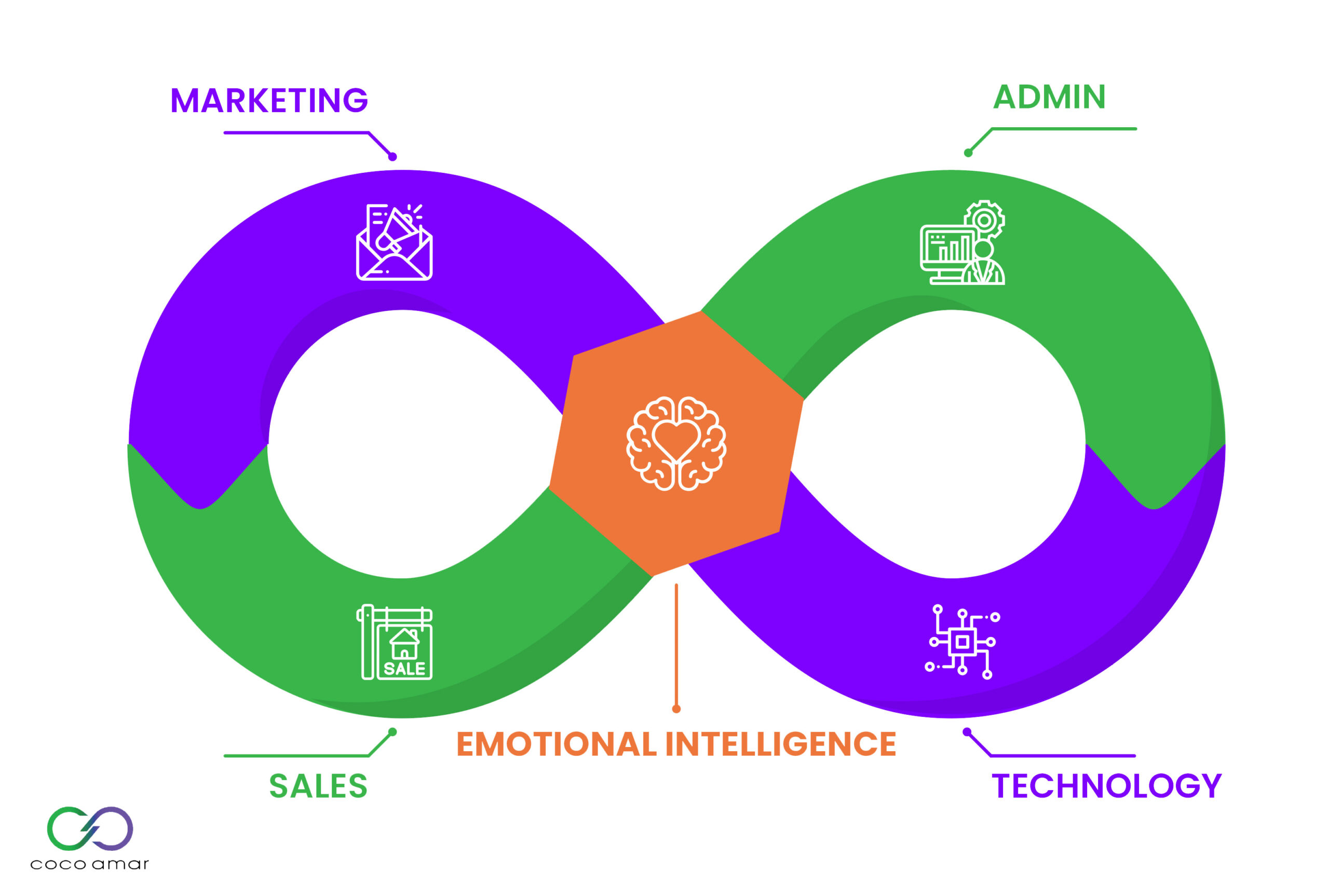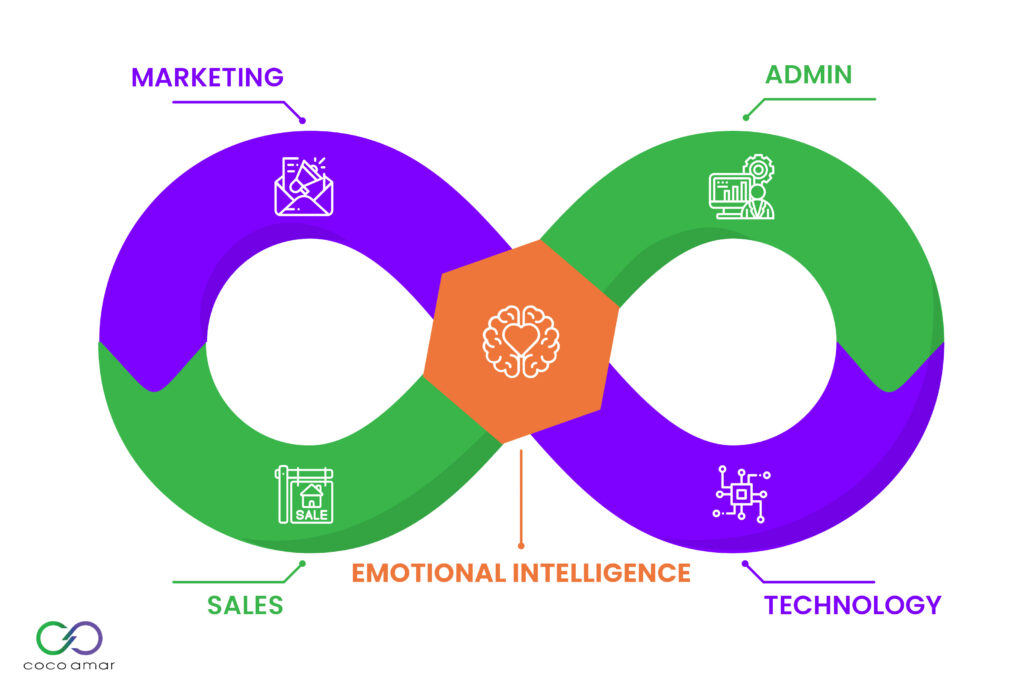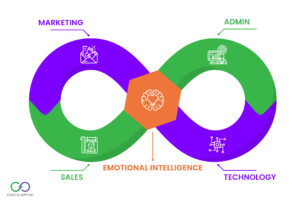As a real estate sales professional, your ability to read, understand, and manage emotions is as crucial as understanding market trends or securing new listings. Emotional intelligence (EQ-I) isn’t a “nice-to-have” skill—it’s a key driver of client relationships, brand strength, and career resilience. Let’s explore each EQ-I component and its direct impact on your success.
1. Self-Regard: The Foundation of Confidence
Self-regarding involves understanding and valuing yourself, recognizing strengths, and accepting areas for growth. In real estate, this self-awareness translates into genuine confidence and authenticity, which clients notice and appreciate.
- Building a Trustworthy Brand: When you believe in your abilities and are honest about your limitations, your brand radiates authenticity, making clients more likely to trust and recommend you.
- Effectively Setting Boundaries: Self-regard enables you to honor your business rules, express them confidently, and set bilateral expectations that will, in the long run, solidify your client relationships.
2. Self-Actualization: Aligning Career Goals with Personal Values
Self-actualization is about growth, goal-setting, and the pursuit of purpose. This drive fuels your passion for real estate and aligns your actions with meaningful, fulfilling goals.
- Business with Purpose: When your brand reflects your values and aspirations, it resonates more deeply with clients, setting you apart from competitors.
- Sustainable Motivation: The desire to keep growing helps you push through challenges, continually learn, and stay engaged with market shifts, making your expertise a valuable asset.
3. Social Responsibility: Building an Impactful Reputation
In real estate, a commitment to social responsibility can enhance your reputation and foster goodwill. Showing care for your community and clients elevates your brand and helps you forge long-term relationships.
- Community Engagement: When you’re actively involved in your community, clients see you as not only a real estate professional but also a neighbor invested in the area’s well-being.
- Trust and Advocacy: Social responsibility strengthens your credibility and cultivates loyal clients who advocate for your services, often through word-of-mouth referrals.
4. Impulse Control: Thoughtful Decision-Making
Impulse control involves managing immediate reactions and making measured decisions. In real estate, where high-stakes situations are common, staying calm and composed is essential.
- Effective Qualifying: Avoid jumping to conclusions or rushing into deals; instead, take time to understand the client’s needs, motivations, and concerns.
- Negotiation Success: Keeping emotions in check during negotiations ensures rational, strategic choices, helping you arrive at mutually beneficial outcomes without unnecessary concessions.
5. Assertiveness: Communicating with Clarity and Purpose
Assertiveness is the ability to express your thoughts, needs, and boundaries clearly while respecting others. In real estate, this skill ensures that your communication is both effective and professional.
- Tactical Assertiveness: By balancing assertiveness with empathy, you can navigate negotiations, advocate for your clients, and maintain a collaborative tone that fosters trust and respect.
- Communicate Effectively: Assertiveness allows you to communicate your value proposition effectively, assert your expertise, confidently pursue listings, and successfully negotiate all the challenges that can arise in real estate transactions.
This skill ensures that your voice is heard, your expertise is recognized, and your interactions are purposeful and productive.
6. Reality Testing: Staying Grounded and Objective
Reality testing means staying grounded, making objective assessments, and setting realistic expectations. In real estate, this skill is vital for offering clients clear, fact-based insights and advice.
- Assessing Properties and Clients: Whether evaluating a property or qualifying a client, reality testing allows you to focus on facts and avoid assumptions, ensuring both you and your clients make informed decisions.
- Business Building: The lucid evaluation of your staff, partners (think, broker), and technology needs and options, saves you from making costly mistakes and allows you to optimize an environment that genuinely supports your business.
7. Interpersonal Relationships: Building Productive Connections
Interpersonal relationship skills help you build and sustain positive connections with clients, colleagues, and staff. Strong relationships are at the heart of a successful real estate business.
- Client Rapport: By demonstrating genuine interest and care for clients’ needs, you foster trust, encourage open communication, and make clients feel valued.
- Team and Staff Dynamics: A collaborative approach with your staff or colleagues boosts morale, increases productivity, and ensures everyone feels invested in your shared goals.
8. Empathy: Understanding and Connecting on a Personal Level
Empathy allows you to understand your clients’ perspectives, needs, and concerns. In real estate, this skill is invaluable in creating a client-centric approach.
- Client Conversations: Showing empathy during conversations creates a safe space where clients feel comfortable expressing their preferences and anxieties, leading to better-aligned service. Tactically, that empathy should not prevent you from being appropriately assertive as unbridled empathy can lead to the blurring of boundaries.
- Negotiation Advantage: Practicing tactical empathy enables you to understand other parties’ motivations without losing sight of the goals of the negotiation. It helps you craft solutions that, while striving for a win-win, always advance your client’s interests. hat.
9. Problem-Solving: Finding Creative Solutions
Problem-solving involves identifying challenges and devising effective solutions. Real estate professionals who excel in problem-solving can anticipate potential issues and address them proactively.
- Overcoming Obstacles: Whether navigating a challenging sale or working through client concerns, an agile problem-solving approach ensures that you address hurdles efficiently and maintain client confidence.
- Innovative Marketing and Branding: Creative problem-solving helps you stand out in a competitive market by finding unique ways to showcase properties, promote your brand, and attract clients.
10. Stress Tolerance: Remaining Composed Under Pressure
Stress tolerance is about managing pressure while maintaining a clear, focused mindset. In a high-stakes field like real estate, the ability to handle stress gracefully is critical.
- Client Reassurance: When you manage stress well, clients sense your calm and feel reassured, even in complex or high-pressure situations.
- Business Resilience: Handling setbacks with composure helps you stay focused on long-term goals and maintain a positive outlook, making you a resilient, reliable professional.
11. Flexibility: Adapting to Change with Ease
Flexibility is the ability to adapt quickly to new information, shifting client needs, or industry changes. It’s a must-have skill in real estate’s dynamic landscape.
- Responsive Service: Being flexible enables you to adjust your approach to meet each client’s unique needs, enhancing client satisfaction and loyalty.
- Adaptation to Market Trends: Flexibility keeps you open to learning new strategies, embracing technology, and responding swiftly to market trends, keeping your business competitive.
12. Happiness: Bringing Positivity to Every Interaction
Happiness in emotional intelligence reflects an overall sense of well-being and satisfaction, which directly affects client interactions and team dynamics.
- Positive Client Experience: A happy, optimistic outlook is contagious and makes clients feel welcome and comfortable, improving their experience with you.
- Team Morale: Leading with positivity encourages a constructive, enjoyable work environment, which can improve productivity and foster strong team relationships.
Embracing EQ-I for Holistic Real Estate Success
Each of these components—self-regard, self-actualization, social responsibility, impulse control, reality testing, interpersonal relationships, empathy, problem-solving, stress tolerance, flexibility, and happiness—builds upon one another, creating a robust emotional foundation for real estate professionals. By prioritizing these aspects of emotional intelligence, you can achieve a balanced, client-centered approach that leads to both personal and professional success.






